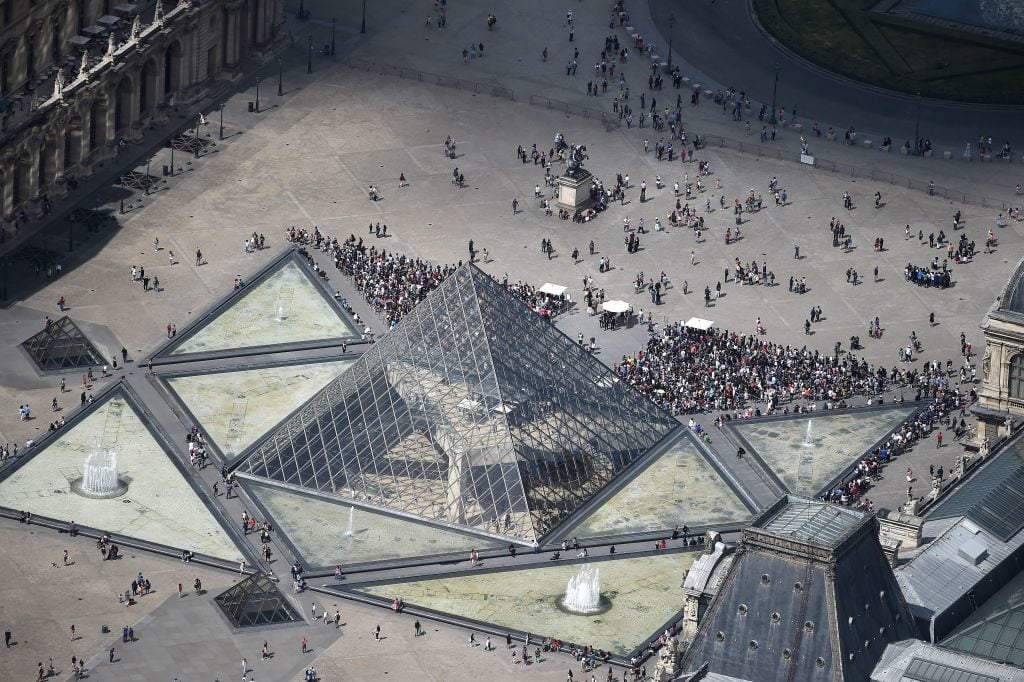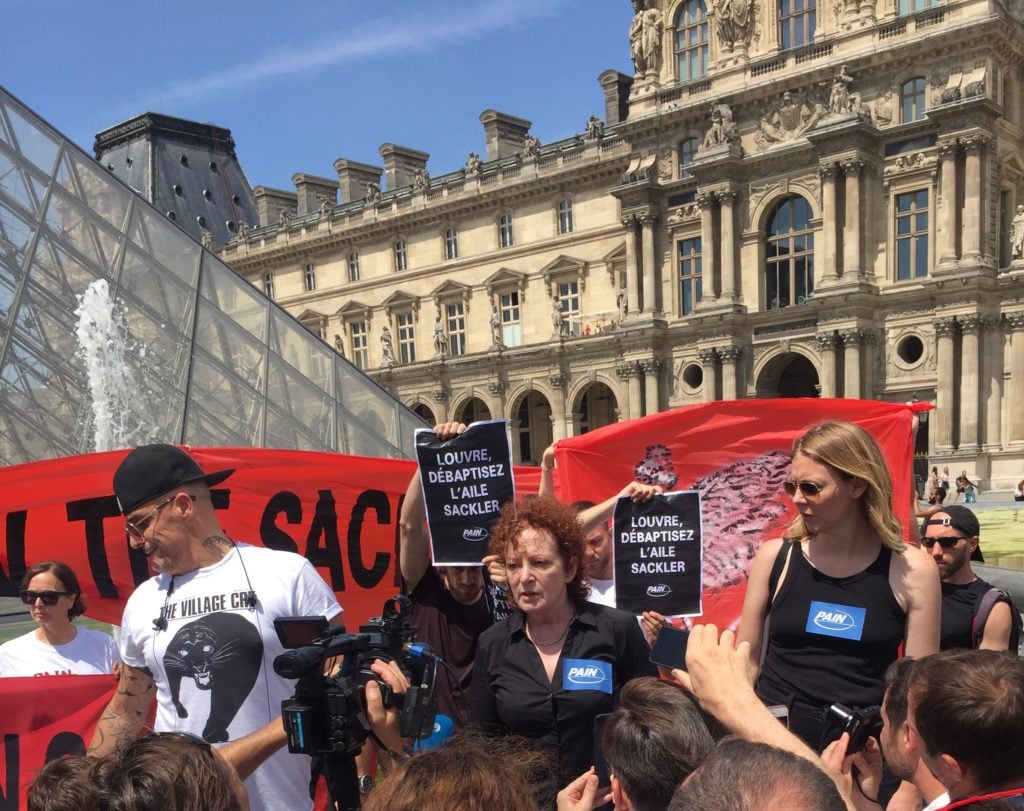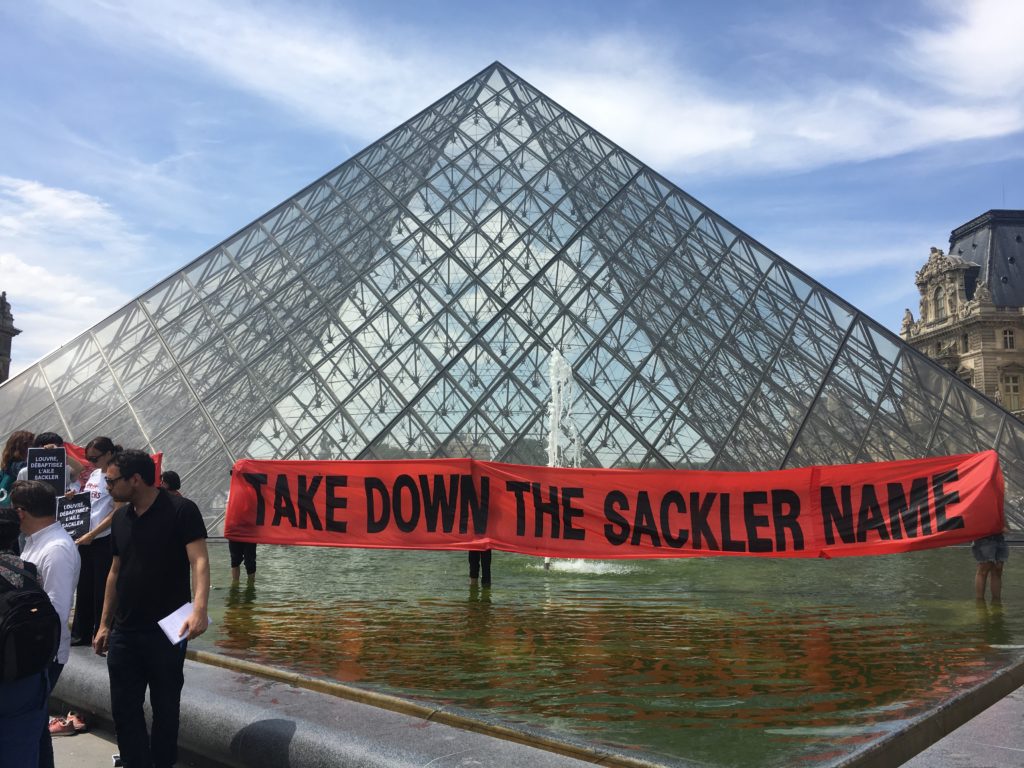Politics
Nan Goldin and Anti-Sackler Opioid Activists Swarm the Louvre, Marking Their First Action in Europe
The guerrilla activists unfurled large banners in front of the Louvre pyramid and staged a die-in.

The guerrilla activists unfurled large banners in front of the Louvre pyramid and staged a die-in.

Kate Brown

Demonstrations against the Sackler empire have officially arrived on European soil. Photographer Nan Goldin and a local branch of her advocacy organization Sackler PAIN have taken on the Louvre, the most celebrated and widely visited museum in the world.
At 2:30 p.m. on Monday in Paris, Goldin and a swarm of around 40 artists and activists appeared among the crowds at the Louvre’s central pyramid and pulled out a banner in front of the iconic entryway. Standing in the fountains around the glass landmark, they held up the block-lettered statement, “Louvre take down the Sackler name.” After speaking in front of the crowd, Goldin staged a “die-in” in front of the triangular fountain.
Sackler PAIN is demanding that the museum remove the family’s name from several of its wings, including the Sackler Wing of Oriental Antiquities, to acknowledge the role some members of the family played in the promotion and distribution of the highly addictive opiate Oxycontin. The group has carried out similar actions across the US, most recently at the Metropolitan Museum of Art and the Solomon R. Guggenheim Museum, as well as in Boston and Washington, DC. During this time, institutions including the Met, Tate, and the National Portrait Gallery in London have publicly stated they would not accept further donations from certain members of the Sackler family.

Nan Goldin speaking at the protest outside the Louvre. Photo courtesy Sackler P.A.I.N.
“We have effectively taken on the Sacklers here in the US, but we don’t want people to forget that this is an international brand,“ a spokesperson for the group tells artnet News. “If they go bankrupt in the US, the Sacklers will still have Mundipharma,” she says, referring to the sister company of Purdue Pharma. The European arm operates in 120 countries worldwide and was founded by Mortimer and Raymond Sackler.
“Twelve rooms in the Louvre (in the Oriental Antiquities wing) are named after the Sacklers, following their donation of 10 million francs in 1997. We do not accept that the Louvre bears the name of a family complicit in crime,” the group wrote in a statement provided to artnet News. “As the most visited museum in the world, the Louvre should set an example of irreproachable ethics by disengaging from its links to this criminal philanthropy. Renaming the Sackler wing is within reach,” they say. The group points to an internal Louvre bylaw that stipulates naming rights to particular rooms can be revoked, even following donations.
The Louvre declined to comment beyond pointing out that the Theresa and Mortimer Sackler Foundation supported the renovation of the rooms dedicated to Persian and Levantine Art in 1996 and 1997 and that there has been no other donation from the Sackler family since then.

Photo courtesy Sackler P.A.I.N.
In the US, Purdue Pharma has faced some 2,000 lawsuits for its alleged role in the spiraling opioid crisis, which has taken 400,000 lives in the past 20 years. A report by the Associated Press revealed that its sister company, Mundipharma, is currently embroiled in a lawsuit over alleged “kickback” payments to an Italian doctor to promote painkillers. (A spokesperson for Mundipharma Europe has said that while two managers accepted plea bargains related to the probe in January, the company has not admitted wrongdoing and denies endorsing messages that minimize risks associated with the drug.)
While local US governments and Congress are working to address the opioid crisis in America, consumption of opioids is growing internationally. The average number of opioid-related deaths has increased by more than 20 percent from 2011 to 2016, with notable spikes in Sweden, Norway, Ireland, England, and Wales. In France, around four people die each week from opioid-related causes.
Though Goldin is American, French institutions and the French government have demonstrated a deep commitment to her work. The photographer was awarded the highest level of recognition in the Ordre des Arts et des Lettres in 2006. She’s also no outsider at the Louvre. In 2011, she presented “Scopophilia” at the museum, a slideshow that paired her own photographs of friends and lovers with photographs she took of works in the institution’s collection.